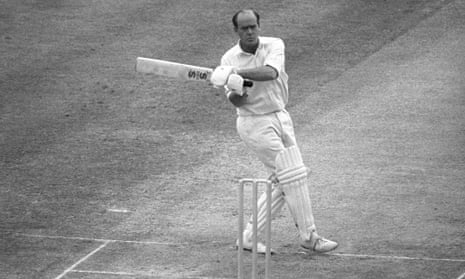In 1978 the cricketer Brian Close produced an autobiography entitled I Don’t Bruise Easily. The claim was difficult to reconcile with photographs that showed the upper half of his body battered black and blue. He bruised very easily indeed, it seemed, as at the hands of the West Indian fast bowlers Wes Hall and Charlie Griffith in 1963. But that was because his immense physical bravery and his refusal to shirk the challenge of the fastest bowlers constantly placed him in the line of fire – and there was a lot of fire about in the course of Close’s protracted career.
Close, who has died aged 84, did not achieve the greatness that his precocious talents promised. His record in first-class cricket, almost 35,000 runs (at an average of 33.26), almost 1,200 wickets (26.42), is that of a considerable all-rounder, but not of the world-beater his performances in 1949 suggested he would become; at just 18, and in his first season in county cricket, he was the youngest player to perform the all-rounder’s double of 1,000 runs and 100 wickets.
He became England’s youngest cricketer when he played against New Zealand that year. The following year, while still on national service, he was selected for Freddie Brown’s Ashes tour to Australia in 1950-51. He scored 108 not out in the first tour match but there was disappointment in his only Test, in which he scored 0 and 1.
There were disappointments strewn all through his colourful career for Yorkshire and England before he spent his last professional years in a gentler environment, helping to build an exceptionally gifted young side at Somerset, where he was nicknamed the “Bald Old Blighter” and viewed with a combination of awe and terror by those who encountered him.
A gifted all-round sportsman, Close even declared that he could fight for boxing’s heavyweight championship of the world: “I might get knocked out, but no one could hurt me,” he once declared, with his distinctive laugh, although he was perfectly serious. “I could beat Ali and Frazier on the same night.”
He once walked through a glass door he had not seen, and was unhurt. On another occasion, fielding at short-leg and struck a heavy blow on the head, he shouted “Catch it!” before falling to the ground. When other batsmen would show pain or rub a bruise he would ask, incredulously: “How can the ball hurt you? It’s only on you for a second.”
His most famous innings were both against West Indian fast bowlers, at Lord’s in 1963 and at Old Trafford in 1976, when, recalled to the side at the age of 45 to show the youngsters how to do it, he endured a barrage of short-pitched bowling in fading light, and without the benefit of the helmet that was soon to become popular.
As a captain he led by heroic example, winning six out of seven Tests. If he lacked the deep-thinking shrewdness of his team-mate Ray Illingworth, his fearlessness and physical strength commanded as much respect, even though he was sometimes guilty of impulsiveness. One England player who played under both said: “Illy would treat different players differently, according to their needs. Closey was more direct and treated everyone the same.” He also won respect as an unselfish cricketer, and one with enormous talent, batting left-handed and bowling with his right arm, either off-spin or medium-pace.
Close was born in Rawdon, Leeds, to Harry, a weaver, and Esther (nee Barrett). He contemplated a career in professional football before establishing himself as a cricketer. It is often said that his early appearance for England set him back. Certainly, his 21 Test appearances after that were scattered thinly. And when, at Old Trafford in 1961, he got himself out heaving against the leg-spin of Richie Benaud, he was banished from the side for some time.
That brave 70 against Hall and Griffith in 1963 helped re-establish his position, and he famously distracted Hall by advancing down the wicket as the West Indian came in to bowl. That year he also became captain of Yorkshire, which he led to four county championships. In 1966 he was appointed England captain for the final Test against the West Indies at the Oval. His leadership was brilliant, England won and Close led his country again the following summer, against India and Pakistan.
But he lost the job when he got into trouble for adopting time-wasting tactics in a championship match against Warwickshire. With typical stubbornness, he refused to apologise. He lost the Yorkshire captaincy in 1970, but the following year moved to Somerset, where he was captain between 1972 and 1977.
Peter Roebuck, who played under him in those years, once recalled: “His leadership might have been erratic but it never lacked guts and drive. He might swear at his team, pursue some extraordinary tactic to its bitter end, yet he never lost his popularity as a man. You could tolerate a great deal from someone who fought so hard to win.”
Close returned to Yorkshire as manager and then cricket chairman, and carried his first-class career until the age of 55 by becoming a regular and popular player in the end-of-season Scarborough festival. He was appointed CBE in 1972.
He is survived by his wife Vivien, their son, Lance, and daughter, Lynn.

Comments (…)
Sign in or create your Guardian account to join the discussion